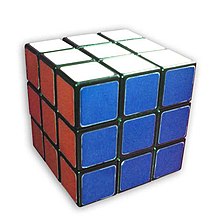Rubik's Cube
ABOUT IT
Rubik's Cube is a 3-D combination puzzle invented in 1974[1][2] by Hungarian sculptor and professor of architecture Ernő Rubik. Originally called the Magic Cube,[3] the puzzle was licensed by Rubik to be sold by Ideal Toy Corp. in 1980[4] via businessman Tibor Laczi and Seven Towns founder Tom Kremer[5] and won the German Game of the Year special award for Best Puzzle that year. As of January 2009, 350 million cubes had been sold worldwide,[6][7] making it the world's top-selling puzzle game.[8][9] It is widely considered to be the world's best-selling toy.[10]
On the original classic Rubik's Cube, each of the six faces was covered by nine stickers, each of one of six solid colours: white, red, blue, orange, green, and yellow. Some current versions of the cube have been updated to use coloured plastic panels instead, which prevents peeling and fading.[11] In currently sold models, white is opposite yellow, blue is opposite green, and orange is opposite red, and the red, white, and blue are arranged in that order in a clockwise arrangement.[12] On early cubes, the position of the colours varied from cube to cube.[13] An internal pivot mechanism enables each face to turn independently, thus mixing up the colours. For the puzzle to be solved, each face must be returned to have only one colour. Similar puzzles have now been produced with various numbers of sides, dimensions, and stickers, not all of them by Rubik.
invention
In the mid-1970s, Ernő Rubik worked at the Department of Interior Design at the Academy of Applied Arts and Crafts in Budapest.[15] Although it is widely reported that the Cube was built as a teaching tool to help his students understand 3D objects, his actual purpose was solving the structural problem of moving the parts independently without the entire mechanism falling apart. He did not realise that he had created a puzzle until the first time he scrambled his new Cube and then tried to restore it.[16] Rubik applied for a patent in Hungary for his "Magic Cube" (Bűvös kocka in Hungarian) on 30 January 1975,[3] and HU170062 was granted later that year.
 | |
| Other names | Magic Cube, Speed Cube, Puzzle Cube, Cube |
|---|---|
| Type | Combination puzzle |
| Inventor(s) | Ernő Rubik |
| Company | Rubik's Brand Ltd |
| Country | Hungary |
| Availability | 1977: as Hungarian Magic Cube, first test batches released in Budapest 1980: as Rubik's Cube, worldwide–present |
| Official website | |
Move notation
Many 3×3×3 Rubik's Cube enthusiasts use a notation developed by David Singmaster to denote a sequence of moves, referred to as "Singmaster notation".[51] Its relative nature allows algorithms to be written in such a way that they can be applied regardless of which side is designated the top or how the colours are organised on a particular cube.
- F (Front): the side currently facing the solver
- B (Back): the side opposite the front
- U (Up): the side above or on top of the front side
- D (Down): the side opposite the top, underneath the Cube
- L (Left): the side directly to the left of the front
- R (Right): the side directly to the right of the front
- ƒ (Front two layers): the side facing the solver and the corresponding middle layer
- b (Back two layers): the side opposite the front and the corresponding middle layer
- u (Up two layers): the top side and the corresponding middle layer
- d (Down two layers): the bottom layer and the corresponding middle layer
- l (Left two layers): the side to the left of the front and the corresponding middle layer
- r (Right two layers): the side to the right of the front and the corresponding middle layer
- x (rotate): rotate the entire Cube on R
- y (rotate): rotate the entire Cube on U
- z (rotate): rotate the entire Cube on F
SOLVING METHOD
BY FOLLOWING THIS VIDEO AND BLOG YOU CAN SOLVE AND KNOW ABOUT RUBICS CUBE😃
THANKYOU
WHO KNOW HOW TO SOLVE RUBICS CUBE COMMENT DOWN BELOW
ReplyDelete